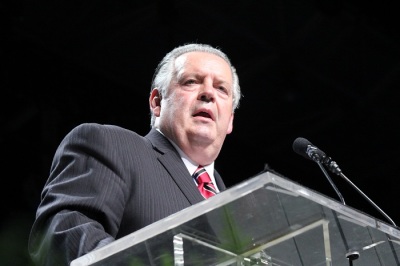Presidents’ Day reminds Americans of our priceless national heritage

On Monday, Americans will celebrate Presidents’ Day honoring the birthdays of the country’s two greatest presidents: George Washington and Abraham Lincoln. Washington, the aristocratic southern plantation owner, and Lincoln, the log cabin-born mid-western self-made man. They came from starkly different backgrounds and life experiences, and yet they literally shaped America into the nation it ultimately has become. No other presidents have been as formative and inspiring in molding both the American national character and its form of government, not to mention the presidential office itself.
George Washington was indeed the father of the country. He guided the newborn nation successfully through its formative crisis, the Revolution. Overwhelmingly popular as a national hero, having led the Continental Army to victory over the modern world’s first superpower, Great Britain, Washington rejected offers to become a monarch, and refusing to shackle Americans with the prerogatives of European monarchy.
Most historians believe Washington’s greatest gift to his country was to impose upon himself a voluntary two-term limit on presidential service, surrendering political power and retiring to private life in Mount Vernon. This extraordinary, virtually unprecedented, voluntary surrender of political power bequeathed our country the tradition of the restraint of executive power in the federal government that has served America so well for more than two centuries. King George III is reported to have said when he heard that Washington had stepped away from power after only two terms, “Then Washington is truly a great man.”
Almost all Americans would agree. He helped us forge a government of the people, by the people, and for the people.
Abraham Lincoln became president in the midst of the nation’s second great crisis —the split over slavery that descended into a horribly bloody civil war, American against American, for four terrible and destructive years. The entirety of Lincoln’s presidency was filled with preparation for war, war itself, and its bitter aftermath, made yet more bitter by perhaps the worse individual calamity to ever befall the American people —Lincoln’s assassination. In the midst of the terrible bloodletting that was America’s Civil War, Lincoln struggled for answers to provide greater meaning and purpose that would justify the agonizing suffering, tormenting the nation, North and South. Elton Trueblood meaningfully described Lincoln as the “theologian of American anguish.”
Lincoln had been a spiritual skeptic in his youth, but increasingly became a man of deep faith as he walked through the fiery crucible of the Civil War where Americans were killing their fellow Americans in horrifyingly heartbreaking numbers. Lincoln declared, “I have been driven many times to my knees by the overwhelming conviction that I had nowhere else to go. My own wisdom, and that of all about me seemed insufficient for the day.”
In November 1863, President Lincoln journeyed to Gettysburg, the site of the bloodiest battle ever fought on American soil. The land was still scared and littered with the aftermath of the great three-day battle that had been fought there three and a half months earlier. Lincoln had come to dedicate a cemetery for the tens of thousands of Union soldiers who had been killed. His speech became an almost instant classic, as Lincoln managed to distill into simple, but eloquent language the ultimate meaning of the struggle and the unique nature of the American experiment in self-government. The timeless words of Lincoln’s Gettysburg address touched hearts and minds as they were spoken: “Four score and seven years ago our fathers brought forth on this continent, a new nation, conceived in liberty and dedicated to the proposition that all men are created equal. Now we are engaged in a great civil war, testing whether that nation, or any nation so conceived and so dedicated, can long endure.”
During this address, Lincoln also distilled the essence of the America experiment, as he declared, “that these dead shall not have died in vain — that this nation shall have a new birth of freedom — and that government of the people, by the people, for the people, shall not perish from the earth.”
Now we know from an eyewitness what Lincoln emphasized verbally was in the last lines of that speech. Most people today say “of the people, by the people, for the people,” but Lincoln, when he delivered the speech, said “government of the people, by the people, for the people,” with the emphasis on the American people.
For President Lincoln, and Washington before him, the people were sovereign, and the government gained its authority from the consent of the governed, not top-down government. It is important for Americans to remember this priceless national heritage, as evidence abounds that America faces a crisis of confidence in our governing institutions and in our future itself. It is time for Americans to look to their historical heritage as embodied in Presidents Washington and Lincoln for inspiration and to remember that we are the ones who confer power on the government by our consent, and the government is there to serve us.
This November, we will elect — or re-elect — our nation’s president, along with senators, representatives and governors. We have the opportunity once again to remind our elected officials and those who would be our elected officials that they derive their authority from the people, and that they can be replaced when they forget for whom they work. After all, we have a government of the people, by the people, for the people that shall not perish from the earth.
Dr. Richard Land is president of Southern Evangelical Seminary in Charlotte, North Carolina, and is part of an advisory group for President Donald Trump





























